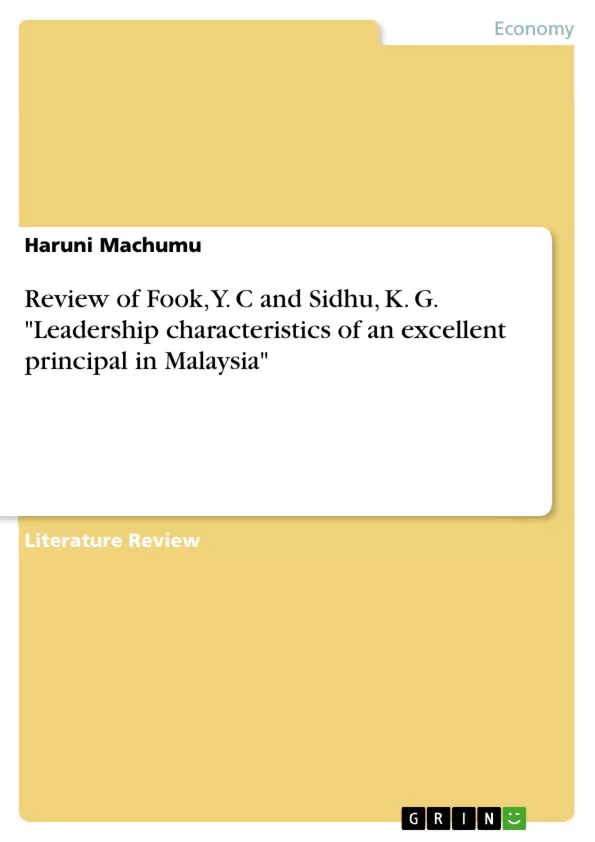This paper presents analysis of a successful leader as discussed in the paper. Leadership characteristics and styles are discussed in line with the reviewed paper. The role played by Malaysia government to reward and motivate school managers, principal to do well in their endeavour are paramount to other part of the world specifically less developed countries. The paper reads well.
Inhaltsverzeichnis (Table of Contents)
- Preliminaries
- Summary of the article content
- Reactions to the article
- The Strength of the article
- Content Strengths
- Methodological Strength
- Relevance of the article to the context (Tanzania)
- The Weaknesses of the article
- Suggestions for improvement
- Issues or topics for further Studies
Zielsetzung und Themenschwerpunkte (Objectives and Key Themes)
This article aims to examine the leadership characteristics of an excellent principal in Malaysia. It analyzes the leadership qualities, styles, and practices of a successful school head, providing insights into effective leadership in education.
- Leadership Characteristics of an Excellent Principal
- Leadership Styles and Approaches in Educational Institutions
- The Role of the Principal in Shaping School Culture and Vision
- The Importance of Effective Communication and Motivation in Leadership
- The Application of Leadership Principles in Diverse Educational Contexts
Zusammenfassung der Kapitel (Chapter Summaries)
The article begins with a clear introduction that outlines the significance of leadership in education, particularly in Malaysia. It then delves into the research design, employing a qualitative case study approach to examine the leadership characteristics of an excellent principal, identified as Aminah. The study highlights Aminah's background, her vision, mission, and leadership strategies, including her leadership styles (instructional, situational, distributing, invitational, and people-centered). The article also explores her personal attributes, administrative roles, and limitations.
The article discusses the implications and recommendations for effective leadership, emphasizing the importance of identifying and promoting leadership competencies such as vision and mission definition, enhanced teaching and learning, creativity, innovation, critical thinking, problem-solving, and effective communication. It also highlights the need for strategic planning and management of competing forces in leadership training for school improvement.
Finally, the article addresses the weaknesses of the study, focusing on the abstract's lack of clarity regarding the research's purpose, methodology, and findings. It also points out the absence of a specified sample size and the study's limited exploration of managerial and postmodern leadership models. It concludes by suggesting areas for further research, particularly regarding invitational, managerial, postmodern, and educative leadership in developing countries like Tanzania.
Schlüsselwörter (Keywords)
This article focuses on the leadership characteristics of an excellent principal in Malaysia, exploring leadership styles, strategies, and their impact on school culture, vision, and student outcomes. The research employs a qualitative case study approach, examining the leadership practices of a successful school head, Aminah. The article explores various leadership models, including instructional, transactional, transformational, situational, invitational, managerial, and postmodern leadership, highlighting their relevance in diverse educational contexts. Key themes include effective communication, motivation, vision definition, teaching and learning excellence, and the importance of creating a positive school environment. The article emphasizes the need for strategic planning, management of competing forces, and continuous professional development for school leaders.
- Quote paper
- Tutor Haruni Machumu (Author), 2011, Review of Fook, Y. C and Sidhu, K. G. "Leadership characteristics of an excellent principal in Malaysia", Munich, GRIN Verlag, https://www.grin.com/document/179728




